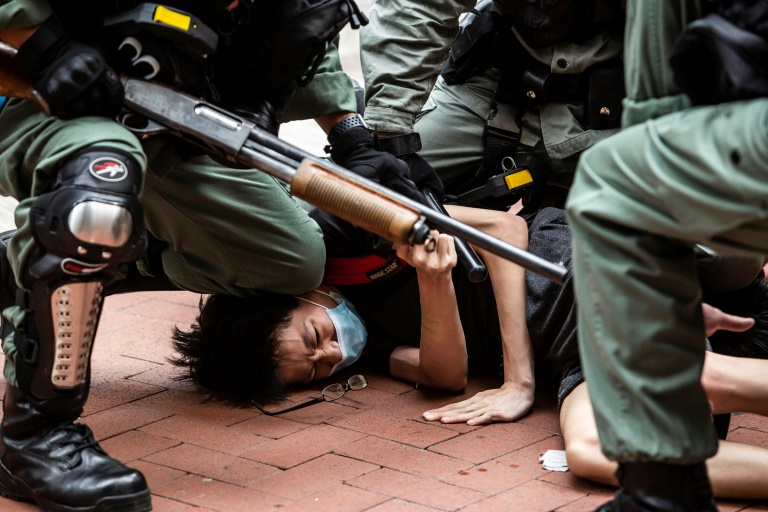Hong Kong’s courts are clogged with a backlog of protester trials nearly a year after an explosion of huge pro-democracy rallies, with hundreds of mostly young demonstrators facing the prospect of lengthy jail terms.
Nearly 9,000 people have been arrested since the often violent protests kicked off last June with 1,600 proceeding to trial so far, according to police.
The result is a judicial system struggling under the strain as Hong Kong lurches through a political crisis that shows no sign of ending.
“This caseload is unimaginable,” said Jonathan Man, a veteran rights lawyer on a team working pro bono to defend around half of those facing charges.
“Each case is only rationed a very small amount of resources from the prosecution and judiciary, which results in investigation and trial delays,” he told AFP.
A three-month closure of most of the court system during the coronavirus outbreak compounded delays.
A university student who asked to be identified as Windy has been on bail for the last seven months.
She is one of almost 600 people charged with rioting, a colonial-era law that carries up to a decade in jail.
“I have to change my life plan as I can’t get a job in a large company if I get convicted,” she told AFP.
Her case illustrates the volume passing through the courts.
She is one of 95 people who were arrested one afternoon in September by police during clashes near the legislature and who are now all on trial together.
– New arrests –
Earlier this month, the defendants appeared in a single courtroom for a mammoth procedural hearing that lasted hours as some 30 lawyers shared microphones to talk to the judge.
Defendants filled the public benches as anxious family members packed the hall outside, some catching naps as the hearings dragged on.
Those denied bail were brought up from the cells below after months in custody.
Shortly after Windy’s hearing, a separate court handed down the first sentence for a rioting case — a 22-year-old lifeguard who pleaded guilty to throwing objects at officers and was jailed for four years.
The Department of Justice said around 200 prosecutors have been assigned to handle cases with additional manpower and outsourced services available if needed.
Yet the caseload is growing with new arrests made each week.
The rallies died down in January as the coronavirus spread but they have flared anew as social distancing measures are eased.
Hundreds have been arrested since last week when large crowds marched against China’s plan to introduce a security law outlawing treason, sedition and subversion — a move activists fear will further erode free speech in the territory.
– Judiciary in spotlight –
With judges now starting to issue rulings, protester anger has begun to turn towards the judiciary.
Chris, part of a volunteer group documenting trials, said his team tries to temper criticism of judges that often flares up on their public chat group.
“Many people do not understand that a verdict isn’t necessarily about a judge’s personal belief,” he said, asking not to use his second name.
He likened judges to having to “draw a straight line with a broken ruler” given to them by the city’s pro-Beijing leadership and the police.
Rights lawyer Man said the courts should not be expected to solve a political crisis that demands a political solution.
“The government has pushed onto the judiciary a problem the courts can’t solve,” he said.
Hong Kong’s top judge Geoffrey Ma has warned that the city’s legal fraternity is being unfairly targeted by the polarised atmosphere.
“Judges look only to the letter of the law and to the spirit of the law and nothing else,” he said in January.
However, in April, one judge caused anger after he openly sympathised with a pro-government supporter who stabbed three people.
The judge called the attacker “a bloodstained victim” of the protesters as he sentenced him to 45 months in jail.
Ma later criticised that judge and said he would not preside over future protest trials.
Meanwhile, Man says he does not expect his caseload will ease up any time soon.
“The authorities think the movement will stop after the ‘trouble makers’ are rounded up,” he said. “But they are actually just creating more enemies.”
AFP

